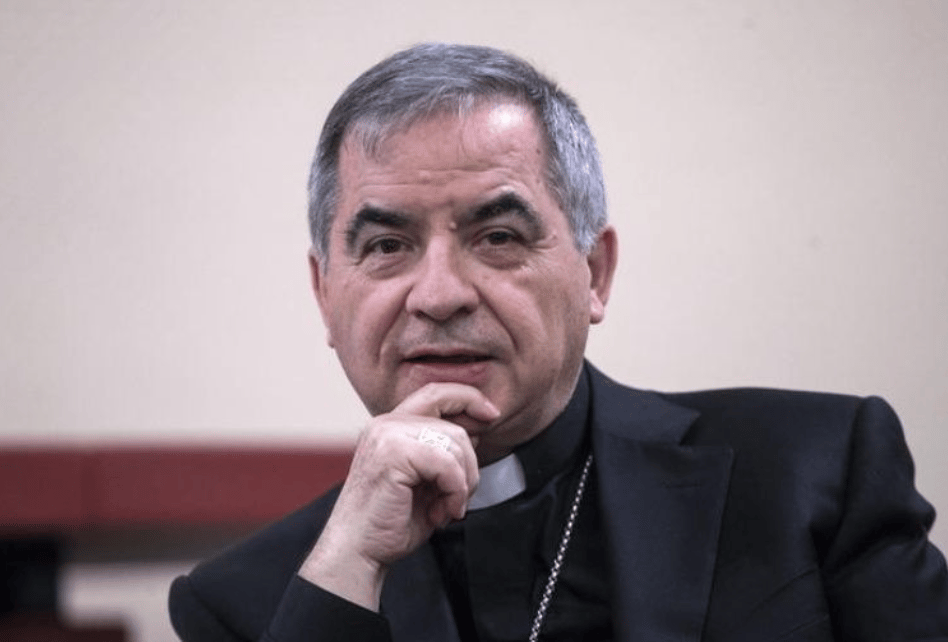DENVER – Lawyers for Italian Cardinal Angelo Becciu, the principal defendant in the Vatican’s “trial of the century,” on Wednesday accused the prosecutor of attempting to “monstrify” the cardinal, in part by relying on a “Bermuda’s triangle” of witnesses which “didn’t cause airplanes to disappear, but the truth.”
Attorney Fabio Viglione made the assertions during closing arguments in the long-running trial against ten defendants, including Becciu, which is current heading towards verdicts expected in mid-December.
“There was a desire to ‘monstrify’ the cardinal, [but] the ambitious structure developed by the prosecution found no confirmation,” Viglione told the three-judge panel overseeing the case.
“All the evidence denied the prosecution’s theses, thanks to extravagant forms of reconstructions of facts. We arrive here calmly, with an active assessment of the cardinal’s innocence,” he said, requesting that Becciu be acquitted.
Although most of the defendants in the trial are charged exclusively for their roles in the controversial $400 million purchase of a London property by the Vatican’s Secretariat of State, Becciu also was indicted for two other allegedly criminal transfers: One to a charity in Sardinia led by his brother, and another to a lay female security consultant for the liberation of a missionary nun kidnapped in Mali.
Both through his attorneys and in his own voice, Becci repeatedly has denied wrongdoing in each case.
In his presentation Wednesday, Viglione focused on the role of the star prosecution witness, Italian Monsignor Alberto Perlasca, a former aide to Becciu when he served as the sostituto, or “substitute,” meaning the number two official in the Secretariat of State.
“If there were a hit parade of the names most often spoken in this trial, he’d be in first place,” Viglione said.
He noted that in the course of the trial, it emerged that Perlasca’s testimony had been prepared with the assistance of two other figures: Genoveffa Ciferri, a consecrated secular Franciscan, a onetime consultant for the Italian security service, and a longtime personal friend of Perlasca; and Francesca Immacolata Chaouqui, a former PR consultant and a former member of a Vatican panel studying financial reform who was convicted in the “Vatileaks 2.0” case for passing confidential documents to Italian journalists.
At the time of her conviction, Chaouqui made clear that she blamed Becciu for her difficulties.
When Ciferri and Chaouqui testified in January, they contradicted one another on a wide variety of points, leaving it unclear at the time who had actually shaped Perlasca’s presentation to the court.
Referring to the intersection of Perlasca, Ciferri and Chaouqui as a “Bermuda triangle,” Viglione said the only difference “is that while [the Bermuda triangle] made airplanes disappear, this one made the truth disappear.”
“Perlasca changed our life, he changed the story of this trial,” Viglione told the court. “He derailed and deviated the course of the investigations,” he said, claiming that Perlasca’s testimony “contained no clarification, only a target to strike,” meaning Becciu.
On the specifics of the allegations, Viglione and Beccciu’s other attorney, Maria Concetta Marzo, insisted that evidence submitted in the trial demonstrated that Becciu never benefitted financially from any of the disputed transactions.
It was a point repeated by Becciu himself in an interview with Italian television Wednesday night, in which he insisted that “I never stole, and I never improved my economic position: I don’t have villas, I don’t have houses, I don’t have apartments, and my accounts are very, very modest.”
On the London deal, Marzo argued that Becciu was never the prime mover, arguing that prosecutor Alessandro Diddi had failed to produce any evidence of a transaction initiated and approved by Becciu.
On the transfer of roughly $135,000 to the organization in Sardinia run by Becciu’s brother Antonio, Viglione and Marzo insisted that the money went to purely charitable ends, and that no evidence suggested that either Becciu had received any economic benefit.
“There was no spoils system,” Viglione said.
With regard to the funds for the kidnapped nun, which were transferred to a lay Italian security consultant named Cecilia Marogna, the prosecution alleges that Marogna used some portion of the funds to purchase luxury items for herself, at one point suggesting that she was Becciu’s “kept woman.”
Marzo argued that Becciu was “the first to be deceived” by those expenses, and scoffed at the notion that she was a “kept woman,” noting that most of the payments actually came under Becciu’s successor as the sostituto, Venezuelan Archbishop Edgar Peña Parra.
The attorneys also noted that as a matter of fact, the kidnapped nun, Colombian Sister Gloria Cecilia Narvaez, was freed in October 2021.
In his interview with Italian television, Becciu declined to say whether he might request a pardon from Pope Francis should he be found guilty.
“I don’t want to think about the eventuality of a condemnation,” he said. “I have faith.”
Becciu’s attorneys are scheduled to wrap up their closing arguments on Dec. 6, with final presentations on behalf of both the prosecution and the defense set for Dec. 11 and 12. Presiding Judge Giuseppe Pignatone has said that he wants to deliver verdicts in the case by Dec. 16.












